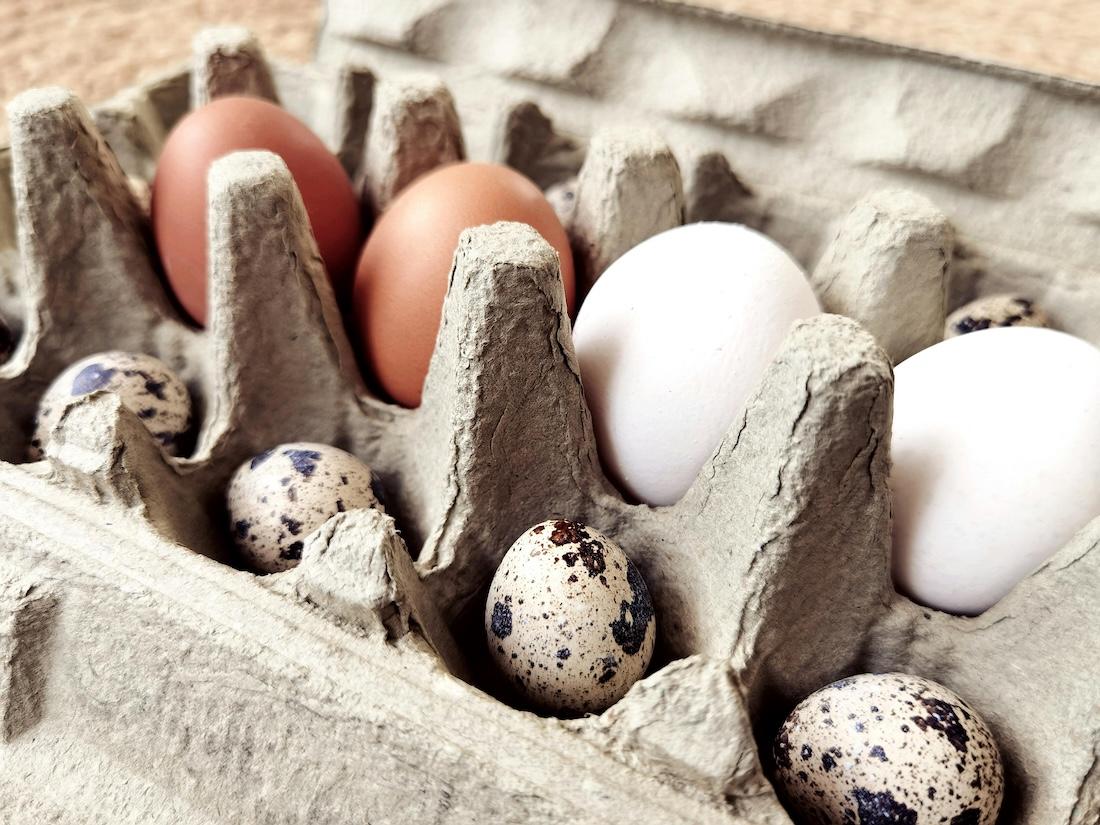Across Texas, quail eggs have moved from novelty to everyday discovery—showing up at farmers markets, small grocery co-ops, and even farm experiences where visitors learn about game bird production firsthand. Their tiny size and speckled shells make them feel special, and they’re often praised online as a “superfood.”
But are they really healthier than chicken eggs? The science tells a more nuanced story. Here’s what current research says about nutrition, cholesterol, allergies, and safety—plus how to enjoy quail eggs responsibly.
🍳 Nutrition: The Real Numbers
Quail eggs are about one-fifth the size of a chicken egg, so comparisons need to be made by weight. According to USDA FoodData Central, quail eggs contain slightly more protein, fat, and key micronutrients—like vitamin B12, riboflavin, and iron—per gram. But because you’d eat four to five quail eggs to equal one chicken egg, the nutritional difference is modest in most diets.
The biggest advantage may come from freshness and sourcing. Many quail eggs in Texas are produced by small farms that focus on short supply chains and humane conditions—factors that can affect flavor and food quality more than nutrient tables alone.
❤️ Cholesterol & Heart Health
Quail eggs do contain more cholesterol per gram, but that doesn’t automatically make them less heart-healthy. Recent reviews suggest that, for most adults, moderate egg consumption doesn’t raise cardiovascular risk. A 2020 meta-analysis found no consistent link between egg intake and heart disease when diet quality was considered (BMJ, 2020). Likewise, Harvard Health notes that dietary cholesterol from eggs has far less effect on blood cholesterol than once believed (Harvard Health, 2023).
In short: enjoy quail eggs in moderation. They can fit comfortably into a heart-healthy pattern—especially when balanced with fruits, vegetables, and fiber-rich foods.
🧠 Antioxidants & Emerging Research
Scientists have found that quail eggs contain bioactive peptides and antioxidants that may help protect cells from oxidative stress. In a 2018 laboratory study, Frossard et al. reported that quail egg homogenate reduced inflammation in a mouse model of food allergy. Still, human evidence remains limited. These findings are interesting but early—they don’t yet translate into proven health benefits.
For now, think of quail eggs as a nutrient-dense food with potential beyond basic protein—not a medical substitute or “functional” cure-all.
🚸 Allergies & Food Sensitivity
Some believe quail eggs are safer for people allergic to chicken eggs, but the evidence doesn’t support that. A 2020 clinical study found that nearly 70 percent of children allergic to hen’s eggs also reacted to quail eggs in skin testing. Proteins between the two species are similar, so cross-reactions are common.
Anyone with an egg allergy should consult an allergist before experimenting. For everyone else, quail eggs pose no unusual allergy risk when fully cooked.
⚠️ Food Safety & Handling
Small doesn’t mean safer. Quail eggs, like chicken eggs, can carry Salmonella if undercooked. The FDA recommends refrigeration, hand-washing after handling raw eggs, and cooking until both the white and yolk are firm. Because quail eggs cook faster, they’re easy to underdo—especially when frying or soft-boiling. Treat them just as carefully as standard eggs.
👉 See also: How to Store, Wash, and Handle Quail Eggs Safely
🍽️ Culinary & Cultural Appeal
Quail eggs appear in cuisines around the world—from Korean bibimbap to Japanese sushi and European canapés—and they’re gaining traction in Texas kitchens too. Their delicate flavor and elegant look make them a hit for cooking demos, picnics, and farm-to-table tastings.
👉 Related: Quail Eggs in Korean Cooking: Tiny Eggs with Big Flavor (Texas Edition)
🌾 Bottom Line
Quail eggs aren’t dramatically healthier than chicken eggs—but they’re not less healthy either. They offer excellent protein, valuable micronutrients, and visual charm. The real difference often comes down to sourcing and experience: how your eggs are raised, handled, and enjoyed.
So if you see local quail eggs at a Texas market—or on a nearby farm tour—give them a try. They’re a small but fascinating example of how regional food traditions continue to evolve.
🔗 Related Reading
- How to Store, Wash, and Handle Quail Eggs Safely
- Quail Eggs in Korean Cooking: Tiny Eggs with Big Flavor (Texas Edition)
- Are Mushrooms Really That Healthy? What Science Says—and Why We’re Still Learning
📚 References
- USDA FoodData Central (2024). Chicken Eggs vs Quail Eggs.
- Harvard Health (2023). Dietary Cholesterol: How Much Is Too Much?
- BMJ (2020). Egg Consumption and Cardiovascular Disease Risk (Meta-Analysis m513).
- Scientific Reports (2018). Quail Egg Homogenate Reduces Allergic Airway Inflammation in Mice.
- Allergologia et Immunopathologia (2020). Cross-Reactivity with Various Bird Eggs in Children Allergic to Hen’s Eggs.
- FDA (2024). Egg Safety Guidelines.





